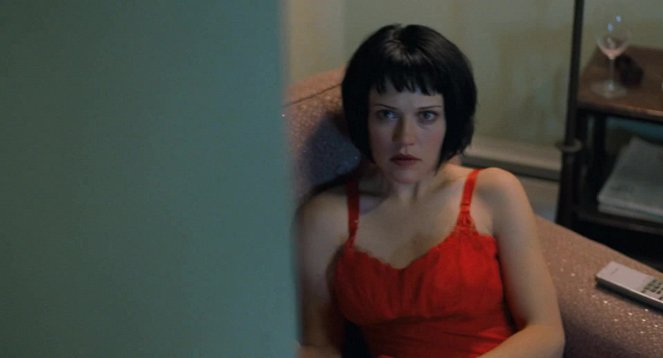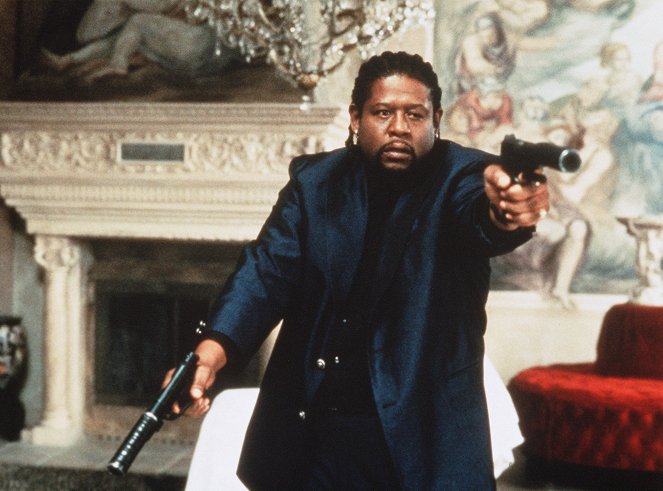Regie:
Jim JarmuschDrehbuch:
Jim JarmuschKamera:
Robby MüllerMusik:
RZABesetzung:
Forest Whitaker, John Tormey, Cliff Gorman, Dennis Liu, Richard Portnow, Tricia Vessey, Henry Silva, Frank Adonis, Victor Argo, Gano Grills (mehr)Streaming (1)
Inhalte(1)
Ghost Dog lebt über der Welt, unter Vögeln, in einer Hütte, die er auf dem Dach eines verlassenen Gebäudes errichtet hat. Ghost Dog ist ein professioneller Killer, der im Dunkel der Nacht verschwindet und sich unbemerkt durch die Stadt bewegen kann. Sein Leitfaden ist ein alter Verhaltenscodex der Samurai. Als Ghost Dogs Grundsätze von der verstörten Mafiasippe, die ihn gelegentlich beschäftigt, sträflich missachtet werden, reagiert er strikt im Einklang mit dem Weg des Samurai. (KinoweltTV)
(mehr)Videos (3)
Kritiken (9)
Weiterer Quatsch im Stile von Jarmusch. Wenn er einen Western dreht, ist es ein langweiliger Schwarzweiß-Hipsterfilm mit Johnny Depp. Als er beschließt, einen Vampirfilm zu drehen, sind Tilda und Tommy überglücklich, dabei zu sein. Oder er recherchiert gerne Billy Murrays frühere Liebschaften. Warum sollte er sich also nicht über die Tatsache lustig machen, dass sich ein Schwarzer mit einem Samurai-Code befasst? Es ist lustig.
()
Ghost Dog war meine dritte Begegnung mit Jarmuschs Werk, und ich habe es immer noch nicht geschafft, mich mit seinem Regie- (und Drehbuch-) Ansatz anzufreunden. Forest Whitaker war als unkonventioneller Samurai überzeugend und gewann meine Sympathie, trotz seines "Berufs". Das größte Problem, das ich hatte, war die zu langsame Abstufung der Handlung, die der "sauberen und ruhigen Arbeit der Samurai" entsprach, aber ich fand sie für den Zuschauer manchmal undankbar. Ich mochte die Einschübe mit den Schnipseln über die Samurai und ich war fasziniert von dem Eismann und seiner Interaktion mit der Hauptfigur (EN vs. FR). Ich glaube, wenn ich ein Hip-Hop-Fan wäre, hätte ich die Vorführung mehr genossen.
()
It’s not as solid as Dead Man, but it’s more approachable for a wider audience. Jarmusch manages to cram a lot of ideas and interesting life insights into what is essentially a simple revenge story of a professional killer who follows the samurai code, thus elevating this film above the ordinary stuff. What I also appreciate is the choice of soundtrack. In Dead Man it was Neil Young's great mimimalism, here it was RZA's hip-hop sounds, which fits the mood of the film perfectly.
()
Fars recommended Ghost Dog to me and, after reading his great review, I decided to set out on the Way of the Samurai. Too bad that Fars fell asleep and didn’t watch to the end, because I think that he would have liked the movie much more. Forest Whitaker slipped hand into glove into his role and he truly is one of the most charismatic killers I have ever seen. The quotations from the code of honor were deep and I already know what I don’t ever want to be. A Samurai. It’s just not the life for me. Even though they could certainly give me a couple of tips. The picture is also full of snappy lines and also the methods of “executing contracts". Such precision is hard to find these days. Bourne would certainly be jealous.
()
Jarmusch studied poetry and a significant number of his films in some way thematise poets or their works, but Ghost Dog is his most poetic film. The director and screenwriter lets his cinematic poem sail on a flow created by remixing and combining entirely disparate genres and cultural traditions, as well as the present and history. Together with his previous Dead Man, Ghost Dog marked a fundamental transformation in Jarmusch’s work that corresponded with the time of its creation. Out of the post-Cold War enchantment with the ideal of freedom enabling people and cultures to come together, which was typical of his previous work, in both of these films he presents us with a vision of a then nascent and now fully formed world where the most bizarre cultural and historical traditions mix and enrich each other as if in a melting pot. Characteristically for Jarmusch, however, in this brave new world he highlights history and its artefacts and relics, admiring the antique patina that radiates melancholy while also coming across as bizarre or ridiculous in the modern world. As such, he approaches not only genres and traditions, but also characters, or rather people generally, with junk-shop love for all things old and a hipster’s enthusiasm for setting them in a new time and context. Just as he puts gangster flicks, samurai movies and animated slapstick into a mutually reflective and harmonious dialogue, he shows us how the mix of such contradictory influences and inspirations shapes us. Jarmusch’s poeticism and warmth are definitively manifested in the fact that he reveals the paradoxical harmony in opposites and shows us that behind all of the Babylonian chaos of different individualities and tribes, which seems impenetrable at first fleeting glance, there remains a common core of humanity that transcends the boundaries of race and language. Culture, or rather the sharing of stories, characteristically remains the bonding agent. Because those stories resonate with us, they allow us to mature and broaden our horizons, but they also connect us with others, either by enabling us to find a common language or by passing them on. The shared library of characters in Ghost Dog contains the whole spectrum, from canonical classics to rousing pamphlets to superficially likable trash, but mainly also types that few people know but that have played or will play an absolutely essential role in shaping particular people. And that is exactly what Ghost Dog itself has become and it was wonderful to see this timeless gem again after many years (again at Aero) and, in the spirit of the film, to hear how much it was liked after the screening.
()



Werbung